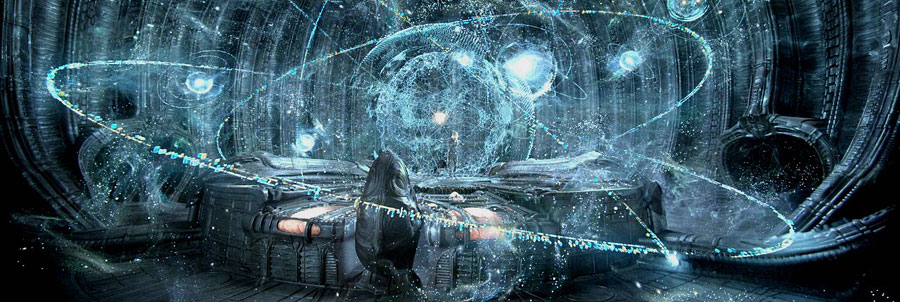
Prometheus

PROMETHEUS
Twentieth Century Fox
Release date (UK): June 1st, 2012
Certificat (UK): 15
Running time: 124 minutes
Director: Ridley Scott
Writers: Jon Spaihts, Damon Lindelof
Cast: Noomi Rapace, Michael Fassbender, Charlize Theron, Guy Pearce, Patrick Wilson
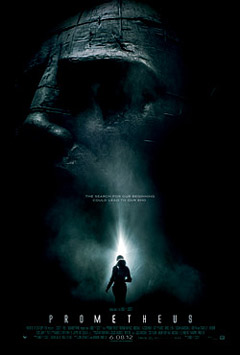
The terrifying beast that made film history with Scott’s Alien back in 1979 has been a part of my (movie) life for almost three decades, and like many fans of the franchise I’ve been waiting for “Alien 5” to solve at least some of the mysteries that had evolved throughout the saga.
On release of the Blu-ray Alien Anthology in 2010, Scott invited his audience to “consider this the ultimate primer for what’s to come”, and that he hoped we enjoy what he has in store for us “as we return to this dark, mysterious universe filled with Aliens, Space Jockeys and…something even more dangerous that you haven’t seen yet.”
His Prometheus, however awe-inspiring and powerful, is not a true prequel though, even if the players and devices of the saga are present — the sinister Weyland Corporation and its ambiguous if reckless agenda, an android, creatures that are not less vicious than the “original” beast, and a character whose destiny is determined by a singular quest.
Apart from that, the film ventures into a different universe that in tone and by way of storytelling makes not only the ordeal and century-long adventures of Lt. Ripley history. Scott also creates a whole new mythology with a quasi-religious subtext, in which creationist ideas are played out against… creationist ideas.
Scientist Elizabeth Shaw (Noomi Rapace) and her partner discover the same pictogram in the murals of disparate ancient civilisations, leading them to believe humankind was created by extraterrestrials who they call “engineers”. Financed by the Weyland Corporation and accompanied by a team of experts, they travel to a far-away planet to find humanity’s makers.
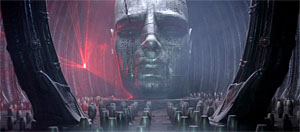 Obviously, what they discover is not what they had expected and in the end, there’s a lot more at stake than satisfying scientific curiosity — and the film itself is about much more than a bloody and more or less merciless battle against deadly creatures.
Obviously, what they discover is not what they had expected and in the end, there’s a lot more at stake than satisfying scientific curiosity — and the film itself is about much more than a bloody and more or less merciless battle against deadly creatures.
The story is truly Promethean but the reference to the titan who was tortured by Zeus for giving fire to the humans only creates the surface layer of the narrative. The fire has become knowledge, and like in ancient times, there is a price to be paid. Although it seems Scott is catering to fan expectations, the film has a subliminal boldness that can take you much further than just along the plot line which itself remains “earthbound” throughout.
Think of Greek statues, those larger-than-life figures made of marble. Imagine the double helix, the omnipresent symbol of the genetic code which is torn apart and 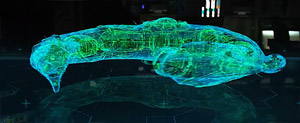 scattered into a gigantic waterfall during the first minutes of the film — maybe only to re-assemble and be the starting point for another evolution, once again.
scattered into a gigantic waterfall during the first minutes of the film — maybe only to re-assemble and be the starting point for another evolution, once again.
This is a sublime vision, and the film opening leaves it at that. Scott doesn’t explain anything but the remainder of the movie carries a verbal and visual symbolism that is perceivable and recognisable but not at all importunate or irritating; in fact, it is profound enough to merit more than one viewing.
Despite its narrative ambiguity, Prometheus doesn’t betray the inheritance of the Saga it has been born from. The action goes into the extremes we remember from the events on the Nostromo ship in the first Alien movie, intense, creepy, shocking — and again, Scott conjures up a deeply visceral dread from dead silence. The universe is not only unspeakably vast and inscrutable, it is unspeakably brutal, too, even if brutality is a term humans have developed to comprehend the disrespect of nature for their own existence.
The need to know and the need to understand are reflected in the film’s two main characters. Not surprisingly, one of them is the android David who behaves as perfectly human as it gets — despite lacking a soul. Latter fact is merely stated as a 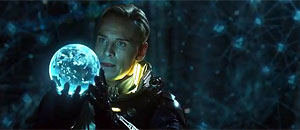 side note by another character but one of the points where the mythic hints spike through the surface of the story.
side note by another character but one of the points where the mythic hints spike through the surface of the story.
David seems to want a soul badly and works hard to become more human. He is a new breed of cybernetics that is more than just a butler, assistant or clandestine agent serving a hidden agenda. Fassbender’s performance is second to none but he is subtle enough not to dominate the cast. Ultimately though, his David delivers most of the key messages of the story — nuanced and with a sometimes cold irony that made me shiver. When he says to himself that “big things have small beginnings” you cannot be quite sure whether he is being cynical or speaks with the grandeur of a machine that understands creation.
He has a peculiar interest in Dr. Shaw, the mastermind of the expedition. The technology at the end of this century allows to watch people’s dreams, in all their plain beauty and dramatic meanings. But Dr. Shaw’s dreams reveal more than just her 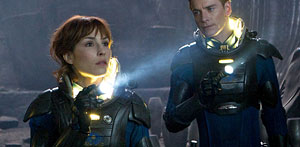 back story, in a way they are projections android David draws his understanding of the human psyche from, and although his interest in the female scientist seems rather emotional, he is also looking deep into the abyss of the human soul.
back story, in a way they are projections android David draws his understanding of the human psyche from, and although his interest in the female scientist seems rather emotional, he is also looking deep into the abyss of the human soul.
There can never be a second Ellen Ripley who guided the audience through the four movies of the Alien saga, and so neither the film nor Noomi Rapace do even attempt to establish a character that could pass as Ripley’s “heir”. Instead, Elizabeth Shaw’s character is a construct of a human being that may be seen as a new kind altogether.
She is a scientist with a spiritual edge rooted in both belief and faith. She lives by the relatively new stance of the Roman Pontificate that the acceptance of extraterrestrial intelligence does not defy one’s belief in god — even if most Catholics would still shudder at Shaw’s question “Who made the maker?”
This woman is not just a brainiac, either. When push comes to shove, she knows what to do — and does it. Her encounter with an alien being is one of the, if not the most frightening scene in the film, and what she does to save herself is not only ripe with symbolism, it also goes much farther than what most humans may be capable of.
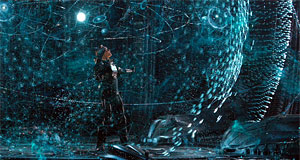 Prometheus was punished, as Franz Kafka put it, “for betraying the secrets of the gods to men” however, in the same piece Kafka concludes, referring to the rock Prometheus was tied to: “The legend tried to explain the inexplicable. As it came out of a substratum of truth it had in turn to end in the inexplicable.”
Prometheus was punished, as Franz Kafka put it, “for betraying the secrets of the gods to men” however, in the same piece Kafka concludes, referring to the rock Prometheus was tied to: “The legend tried to explain the inexplicable. As it came out of a substratum of truth it had in turn to end in the inexplicable.”
So does the movie. Scott not only adds to the mystery of mankind’s origins and opens up a perspective that many people still find disturbing, if they take it seriously to begin with. Considering the discoveries made by numerous scholars, in particular the so-called out-of-place artefacts, there might be more to Kafka’s “substratum of truth” than meets the eye.
The origins of mankind are pulled into question more and more — with or without aliens — and it just takes a bit of digging to see how ferociously mainstream academia is fighting “fringe” ideas on evolution and the history of civilisation(s) on Earth.
On this note, Scott’s Prometheus is more than just the best sci-fi film in years. It dares to be an action-thriller with a rich and intriguing mythology that goes all the way when it comes to some of the oldest — and maybe most important — questions we can ask.
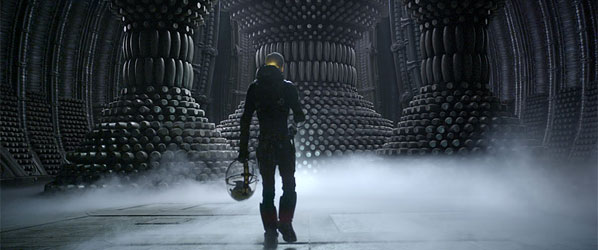

Jonahh Oestreich
One of the Editors in Chief and our webmaster, Jonahh is a photographer and journalist who has been working in the media industry for over 15 years, mainly in television, design and art. As a boy, he made his first short film with an 8mm camera and the help of his father. His obsession with (moving) images and stories hasn’t faded since.
His passion for intricate stories and the ‘seven basic plots’ (ask him!) often times makes his friends and family put him in the doghouse for "predicting" too many twists and endings.
Jonahh has his own blog at De Omnibus Dubitandum, and you can follow him on Twitter @jonahhphoto.
© 2012 STATIC MASS EMPORIUM . All Rights Reserved. Powered by METATEMPUS | creative.timeless.personal. | DISCLAIMER, TERMS & CONDITIONS
HOME | ABOUT | CONTACT | TWITTER | GOOGLE+ | FACEBOOK | TUMBLR | YOUTUBE | RSS FEED
CINEMA REVIEWS | BLU-RAY & DVD | THE EMPORIUM | DOCUMENTARIES | WORLD CINEMA | CULT MOVIES | INDIAN CINEMA | EARLY CINEMA
MOVIE CLASSICS | DECONSTRUCTING CINEMA | SOUNDTRACKS | INTERVIEWS | THE DIRECTOR’S CHAIR | JAPANESE CINEMA

 Please wait...
Please wait...



